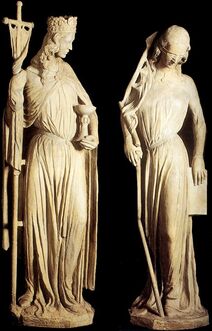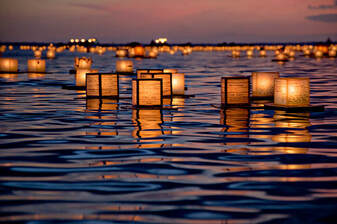
We began by reflecting on a series of illustrations of statues found in many medieval cathedrals around Europe, sometimes carved standing side by side, sometimes standing on either side of the entrance They depict two women. One is weak and drooping, blindfolded and carrying a broken lance with Torah scrolls that are often seen slipping from her hand. The other is strong, often wearing a crown and looking to the future with confidence and open eyes. The blind woman represents the Synagogue, blind to the truth and now lost to salvation because the Jews rejected and crucified Jesus. The confident woman represents the Christian Church upon whom God has bestowed the promises God originally made to Israel so that Christians now possess the truth of salvation and have become God’s chosen ones, the new People of God. One particularly horrendous statue is found in Notre Dame Cathedral in Paris where the blindfold over the ‘Synagoga’ statue is in fact a snake with the implications that has for Judaism being under the sway of the devil.
These statues reflect the attitude of the Christian Church to Jews in medieval Europe and are indicative of a theological approach called supersessionism or replacement theology which is a belief that God has rejected the Jews because they rejected and crucified Jesus. God has now bestowed the promises he made to Israel on the Church that now becomes the New People of God. This theology is very influential. It can affect the way the Christian scriptures are interpreted. For example, in stories such as the wise virgins – the ones who are alert to the coming of the bridegroom are taken as representative of Christianity and the ones who slept and missed his coming taken as representative of Judaism. It influenced the prayer in Catholic churches on Good Friday which prayed for the conversion of the perfidious Jews. It influenced the tradition in the Sisters of Sion who daily prayed that God would forgive the Jews for the death of Jesus for they knew not what they did. It influenced the various pogroms and sermons forced on the Jews over the ages. It influenced the whole history of Christian antisemitism which the Vatican acknowledged was the seed bed in which the hatred that resulted in the Holocaust was able to flourish. It influenced the belief of some Christians that the State of Israel doesn’t have the right to exist. It is, I suspect, something that is deep in the psyche of both Christians and Jews and influences some of our interactions and maybe needs to be addressed at some point. Is there perhaps an incipient suspicion of Christianity on the part of Jews and an incipient superiority on the part of Christians?
Thank God that this attitude to Judaism and this theological approach has been acknowledged, dismissed and disowned by the Catholic Church in the Vatican II document on the Churches Relationship with People of Other Faiths. And it all came about because of that 20-minute interview that Jules Isaac had with Pope John XXIII. Jules Isaac was a historian and educationalist who sought to understand the roots of antisemitism when he experienced the Nazi occupation of his native France. He wrote a book on Jesus and Israel as well as one on The Teaching of Contempt in which he showed that antisemitic interpretations of the scripture were a wrong understanding of the Gospel. It was the meeting with Pope John XXIII that led the Pope to put the Churches relationship to Judaism on the agenda of the Vatican Council and eventually led to Nostra Aetate, the Declaration on the Churches Attitude to Non-Christian Religions which was promulgated by Pope Paul VI in October 1965, two years after the death of Jules Isaac. Section 4 of the document which declares,” in her rejection of every persecution against any man, the Church, mindful of the patrimony she shares with the Jews and moved not by political reasons but by the Gospel's spiritual love, decries hatred, persecutions, displays of anti-Semitism, directed against Jews at any time and by anyone” brought about a profound change in the Church’s relations with Judaism. Indeed, Rabbi David Rosen says he knows of nothing else in history that has brought about such a profound change.
And that brings us back to our original question. What if Jules Isaac had not visited Pope John XXIII? Would we still be promoting a replacement theology? What if Jules Isaac had not been for a walk when his wife and two children were taken by the Nazis and sent to Auschwitz? Would the Church have reflected on its teaching of contempt and still be antisemitic? Who knows. But we can be sure that Jules Isaac’s escape from the Nazis and his visit to the Pope were of such significance that they have changed the history of Catholic – Jewish relations, hopefully forever.



 RSS Feed
RSS Feed
